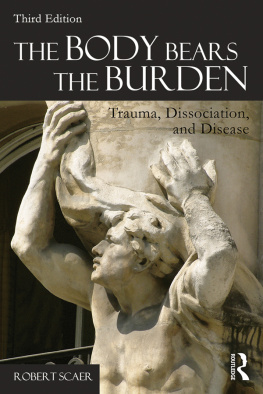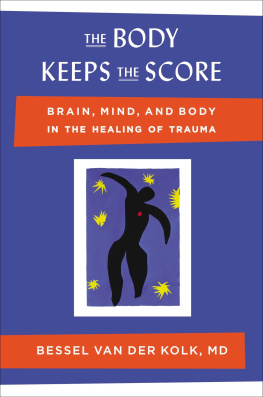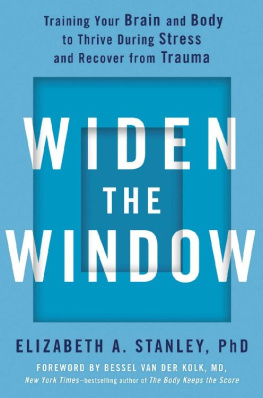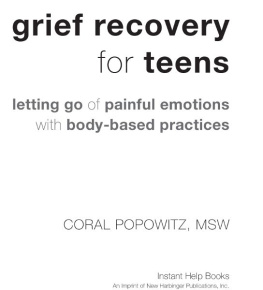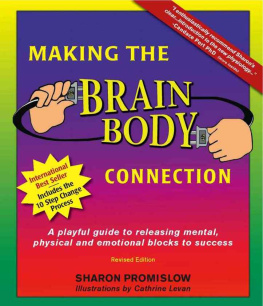8 KEYS TO
BRAINBODY BALANCE
8 Keys to Mental Health Series
Babette Rothschild, Series Editor
The 8 Keys series of books provides consumers with brief, inexpensive, and high-quality self-help books on a variety of topics in mental health. Each volume is written by an expert in the field, someone who is capable of presenting evidence-based information in a concise and clear way. These books stand out by offering consumers cutting-edge, relevant theory in easily digestible portions, written in an accessible style. The tone is respectful of the reader and the messages are immediately applicable. Filled with exercises and practical strategies, these books empower readers to help themselves.
8 KEYS TO
BRAINBODY
BALANCE

ROBERT SCAER, MD
Foreword by Babette Rothschild

Copyright 2012 by Robert Scaer, MD
All rights reserved
First Edition
For information about permission to reproduce selections from this book,
write to Permissions, W. W. Norton & Company, Inc.,
500 Fifth Avenue, New York, NY 10110
For information about special discounts for bulk purchases,
please contact W. W. Norton Special Sales at
or 800-233-4830
Manufacturing by R.R. Donnelley-Harrisonburg
Production manager: Leeann Graham
Library of Congress Cataloging-in-Publication Data
Scaer, Robert C.
8 keys to brain-body balance / Robert Scaer ; foreword by Babette Rothschild. 1st ed.
p. cm.
Includes bibliographical references and index.
ISBN 978-0-393-70747-2 (pbk.)
1. Mind and body. 2. Mind and body therapies. 3. Stress (Psychology) 4. Psychic trauma. 5. Mental healing. I. Title. II. Title: Eight keys to brain-body balance.
BF161.S25 2012
158.1dc23 2012014863
ISBN: 978-0-393-70747-2 (pbk.)
eISBN: 978-0-393-70803-5
W. W. Norton & Company, Inc., 500 Fifth Avenue, New York, N.Y. 10110
www.wwnorton.com
W. W. Norton & Company Ltd., Castle House, 75/76 Wells Street,
London W1T 3QT
1 2 3 4 5 6 7 8 9 0
Contents
by Babette Rothschild
PART I. BRAINBODY BASICS: HOW WE FEEL
AND HOW WE MOVE
PART II. HOW OUR UNCONSCIOUS BRAIN
RUNS THE SHOW
PART III. HOW EXPERIENCE CHANGES OUR BRAIN,
FOR BETTER OR FOR WORSE
Foreword
Traditionally, science and psychology have considered the brain and body to be separate, in the same vein as Descartes proposal of I think therefore I am. However, increasingly, many involved in neuroscience and psychology have come to recognize that the body and brain, including the mind, are inseparably linked, that they interact constantly and on all levels including emotions, decision making, and all sorts of psychological and physical processes.
Basically, the brain is at the center of the universe that is the body; the brain is, indeed, part of the body. It is physically and functionally placed at the center of the central nervous system, the center of the entire nervous system of the body. All of our body processes as well as our awareness of those processessenses, movement, appetites, instincts, skills, thoughts, feelings, and so onwould not exist in the absence of a brain. It is truly an amazing and somewhat mysterious organ and its relationship with the body is awe-inspiring. How it directs and interacts with the body has been a focus of study and speculation for thousands of years. In recent times, brain science and knowledge has accelerated at a rapid pace. What we have learned about the brain to date has more than doubled in just the last few decades.
Unfortunately for the majority of us, most of the scientific writing about the brain and body is in terms that few but the most scientifically oriented can understand. I have been looking for a long time for a book on brain and body that my clients could understand and my students make use of. Enter author Robert C. Scaer. One of his many talents is transforming complicated science into accessible science. I think of him as The Science Guy of neuroscience. His two previous books, The Body Bears the Burden and The Trauma Spectrum, have been widely appreciated for their accessibility and insights. Early in his medical career, Scaer specialized in neurology both as a practitioner and as a clinical professor and he holds a certificate as a Diplomat of the American Board of Psychiatry and Neurology. His theoretical background as well as hands-on experience as a specialist in brain injury, chronic pain, and traumatic stress make for a particularly authoritative blend.
The reader interested in gaining a greater understanding of the brain and body, their relationship and inter-workings, is in for a treat. Scaers book, 8 Keys to BrainBody Balance, is full of enlightening and easy-to-digest information. As well, there are plenty of insights and exercises that make the theory come alive while enhancing the readers own brain and body balance. Scaer makes particular use of his experience in working with patients whose brains and bodies are severely out of balance, including those suffering from stress, traumatic stress, and chronic pain. He emphasizes the hopeful fact that brain wiring can be changed and offers useful tools for improving function.
8 Keys to BrainBody Balance, though full of cutting-edge theory, is not a heady scientific text or treatise. This is a book from one human with a brain and body written purposefully to other humans with brains and bodies. The alienation many of us feel from the one or the other can be healed by learning to listen to both. That said, Scaer in no way loses sight of the complexities he is dealing with, stirring our curiosity while gently challenging us to take concrete steps. This book will be a useful reference for readers whose main interest is in increasing their knowledge about the brain. Its even greater value will be for those who are suffering from the effects of disharmony in the brain/body relationship. With this book, there is help, relief, and healing to be had. I am so enthusiastic about this addition to the 8 Keys Series that I will be adding it to the required reading lists of my own courses and trainings in Somatic Trauma Therapy. It will provide my students with clarification and understanding of concepts and processes that have, until now, long eluded them.
The 8 Keys Self-Help Series aims, among other things, to empower readers to be in charge of their well-being and (where necessary) their healing, whether or not they are utilizing self-help or engaging the services of a helping professional. One of the tools that facilitates confidence in taking those reins is knowledge. Gathering information relevant to whatever issues you are dealing with will enhance your understanding and put you in a better position to evaluate advice you are being given and make your own decisions. Theoryand in the case of psychotherapy, neuroscientific theoryis a particularly powerful resource in this regard. The more you understand about your brain and your body, how they function together and how you can improve their interaction, the better you will be able to help and advocate for yourself. That is why 8 Keys to BrainBody Balance, as well as all of the other books in the 8 Keys Series, highlights the latest available theory and research. The result is a series of intelligent self-help books that not only instruct but also inform.
Next page

